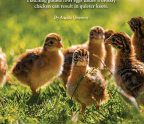BACK To OUR Roots

Back in 2015, you might have noticed a new product in the beer aisle called Not Your Father’s Root Beer. This was an alcoholic beer, 5.9 percent alcohol by volume (ABV), that tasted like root beer soda. Depending on your father’s age, the name was likely appropriate. In recent decades, “root beer” typically refers to a sweet, nonalcoholic (or “soft”) soda. But if you spoke to your grandfather or great-grandfather, you’d probably find their root beer was alcoholic.
Drinks based on root extracts are found in almost every culture. Early North American colonists made beverages from the roots of sassafras (Sassafras albidum), sarsaparilla (Smilax ornata), licorice (Glycyrrhiza lepidota), and other plants. Beverages made from birch bark (Betula lenta), wintergreen leaves (Gaultheria procumbens), vanilla beans (Vanilla planifolia), and other botanical extracts were also popular.
Home production of root beer has declined over the years. In the mid-1800s, root beer could be purchased inexpensively from soda fountains. Hires Root Beer was first bottled in 1876 and is the second-longest continuously produced soda (after Vernors Ginger Ale) in the United States.
In the 1960s, scientists determined that the main essential oil in sassafras root (safrole) was carcinogenic and banned its use in processed foods,* so commercial soft root beer producers changed their formulations to make wintergreen the primary flavor. Later, artificial sassafras flavors were introduced, and
You’re reading a preview, subscribe to read more.
Start your free 30 days





